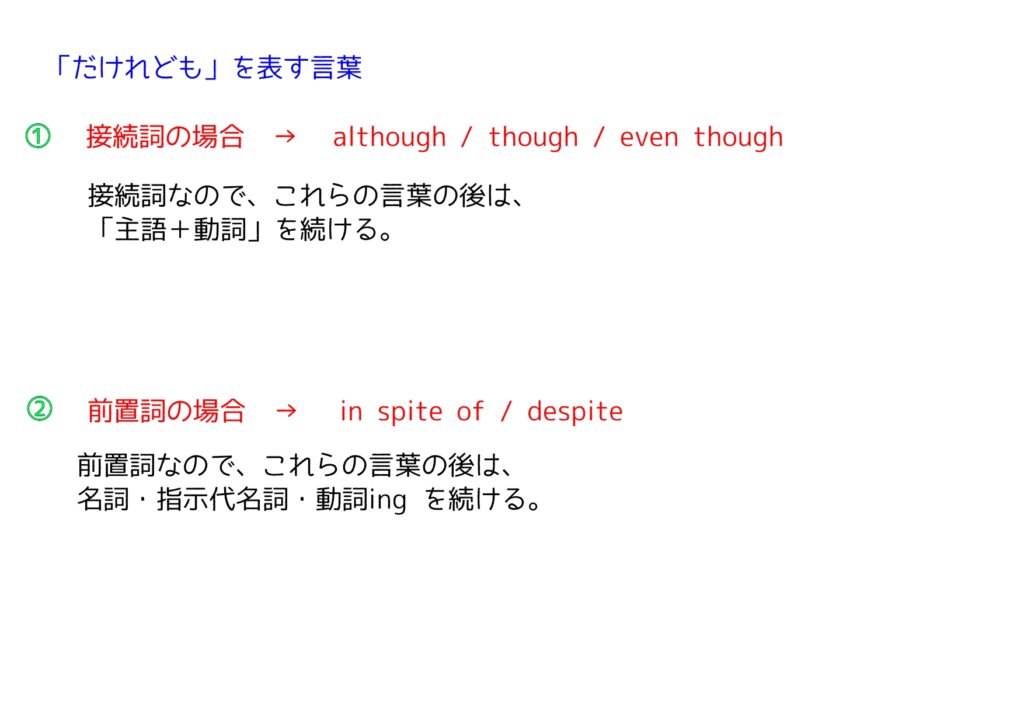第82回:接続詞の中でも、対比を表す表現を確認します。

「だけど…」という対比は日常的に使われるので、知っておくと便利です!
Q. この記事で、一番大事なことって何?
A. 大事なことを、1枚の画像にまとめました。

いちいちノートにまとめるのが面倒だという方、また、
ノートにまとめることが苦手だという方は、ご活用ください。

[広告]
確かな英語力は、日々の継続から。
その継続を後押しする、第二言語習得理論に基づいた
オンライン英語学習プログラムがあります。
英語を使う人のための、確実なスキルアップが望める
7日間の無料体験はこちらから!

1.Althoughとthough
- althoughや(もっとカジュアルな形で)thoughは、主節と副節の間に驚くべき対比があることを表すために使用されます。
- 類似の意味を持つ表現として、despite the fact that / in spite of the fact that(例: Despite the fact that/In spite of the fact that Reid failed to score…)、despite / in spite of + -ing(例: Despite / In spite of Reid failing to score…)、またはdespite / in spite of his/her + noun(例: Despite / In spite of his failure to score…)があります。
- 注意点としては、thoughは文の末尾に置くことができますが、althoughは文末では使えません。
- 例: I eat most dairy products. I’m not keen on yogurt, though.
2.Even thoughとeven if
- even though(even althoughではない)は「~であるにもかかわらず」という意味で使用され、even ifは「~であろうとなかろうと」という意味で使用されます。
- 例: Even though Matt doesn’t speak Spanish, I think he should still visit Madrid.(彼がスペイン語を話せないとしても)
- 例: Even if Matt doesn’t speak Spanish, I think he should still visit Madrid.(彼がスペイン語を話せるかどうかわからないとしても)
3.While, whilst, and whereas
- 正式な文脈では、whileまたはwhilstを使用して「although」と同じ意味で、主節の内容を修飾する要素やそれと矛盾する要素を導入することができます。
- while / whilst節は主節の前または主節内に位置しますが、主節の後には置かれません。
- 例: While there is no evidence that Rob cheated, we were all astonished that he passed the exam.
- なお、whilstは文学的な単語であり、一部の人々は避ける傾向があります。
- whileまたはwhereas(または時折whilst)を使用して、主節と対照する要素を表すこともできます。
- while / whereas節は主節の前または後に位置することができます。
- 例: Juan gets lots of homework from school, while / whereas Mia gets very little.
- 例: While / Whereas I always felt I would pass the exam, I never thought I would get an A grade.
- 主節で言及される内容と矛盾するような従属節がある場合、whereasは使用しません。
- 例: Although / While Sophie’s father is from Spain, she doesn’t speak Spanish.
具体例
- Although and though:
- Although/Though Sarah was tired, she managed to finish her work on time.
- Despite the fact that/In spite of the fact that Sarah was tired, she managed to finish her work on time.
- Despite/In spite of feeling tired, Sarah managed to finish her work on time.
- Despite/In spite of her exhaustion, Sarah managed to finish her work on time.
Example with though at the end of a clause:
- I’m not a big fan of spicy food. I enjoy Indian cuisine, though.
Emphasis on an adjective with though:
- Excited though they were, the children waited patiently for their turn.
- Hot as the weather was, they still enjoyed their outdoor picnic.
- Even though and even if:
- Even though Mark has a fear of heights, he decided to try bungee jumping.
- Even if Mark has a fear of heights, he should still give bungee jumping a try.
- While, whilst, and whereas:
- While/Whilst John excels in sports, his sister is more focused on academics.
- John excels in sports, whereas his sister is more focused on academics.
- Mia gets very little homework, while/whereas her brother is always overwhelmed with assignments.
- Whereas Mia enjoys playing the piano, her brother prefers the guitar.
Example using whereas to indicate a contrasting situation:
- Although Sophie’s parents are both musicians, she has no interest in pursuing a career in music.
Using -ing and past participle clauses:
- Although it was raining, they went for a walk in the park.
- Though tired from the long journey, they continued driving through the night.
- While enjoying their meal, they discussed their future plans.
- Whilst waiting for the train, she struck up a conversation with a stranger.
[広告]
TOEICのスコアを上げたいけれど、
まとまった勉強時間が取れなくて困っている…
なら、細かいスキマの時間を使いながら、
少しずつスキルを積み重ねてみてはどうでしょう。
スマホ1つでスコアアップが出来る、
オンライン講座のリンクはこちらから。

Q. この文法はどうやって使うのでしょうか?
A. 今回の文法を活用した会話文を見てみましょう。

Although it was raining heavily, Sarah still went for a run in the park.
(雨が激しく降っていたけど、サラは公園でランニングしてたんだよ。)

Wow, she’s quite dedicated to her fitness routine.
(えっ、彼女は運動のルーティンに固執しているんだね。)

Yeah, despite the fact that it was pouring, she didn’t let that stop her.
(そうなんだ。激しい雨でも彼女はルーティンを守ったんだ。)

Even though the weather was unfavorable, she persisted. That’s impressive.
(天候が悪くても彼女は諦めなかったんだね。すごいね。)

Absolutely. She’s determined to stay active no matter what.
(まったくその通りだよ。彼女はどんな状況でも積極的に活動し続ける決意があるんだ。)
[広告]
ロゼッタストーン・ラーニングセンターで、最先端の教育制度を活用して英語を学びませんか?私たちは個々の学習ペースに合わせてeラーニングと対面教育を組み合わせ、柔軟な学習環境を提供しています。自宅でのeラーニングと対面教育のメリットを最大限に活かし、あなたの英語学習をサポートします。最新のテクノロジーと個別の指導が組み合わさった当センターで、自由な学習スタイルを体験してみませんか?英語学習を楽しく効果的に進めるための環境がここにあります。新たな一歩を踏み出して、新しい英語学習の旅に参加しましょう!

Q. この記事の要点は?
A. 対比を表す接続詞の確認を行いました。
Contrasts: although and though; even though / if while, whilst and whereas
- Although and though:
- Used to express a surprising contrast between the main clause and the adverbial clause.
- “Though” can be used at the end of a clause.
- “Despite/in spite of the fact that” + clause or “-ing form” can be used with a similar meaning.
- Emphasis can be given to an adjective by using “adjective + though + noun/pronoun + verb” pattern.
- Even though and even if:
- “Even though” means “despite the fact that” and is used when the speaker knows the given condition.
- “Even if” means “whether or not” and is used when the speaker is uncertain about the condition.
- While, whilst, and whereas:
- “While” or “whilst” can be used to introduce something qualifying or conflicting with the main clause.
- “While” or “whilst” clauses can come before or within the main clause.
- “Whereas” can be used to indicate a contrast between two things.
- “While/Whereas” clauses can come before or after the main clause.
- “Whereas” is not used when the subordinate clause makes the main clause unexpected.
- “-ing” and past participle clauses can be used after “although, though, while, and whilst.”
Note: “Whilst” is more literary and less commonly used.
英会話を始めてみたいけれど、どのサービスが良いか分からない…
そんな方は、まず、この記事で3つのサービスを比べてみてはいかがでしょうか?
英語力を効率良く伸ばすことができるサービス3選です。

次回の文法解説は?
「if」を使いこなす。(仮定法)
この記事を作る際に参考にした文法の解説書になります。
すべて英語で書かれていますが、練習問題が付いてます。
イギリス英語なので、スペル等の表記が異なる部分もありますが、
「使い方を練習したい」「繰り返し問題を解きたい」
という方は、使ってみても良いかもしれません。

関連記事一覧
他の文法解説記事を検索できます。





-320x180.jpg)






コメント